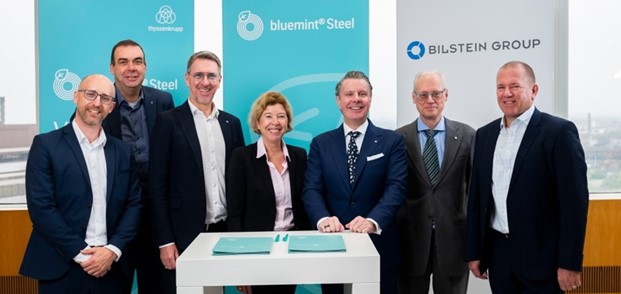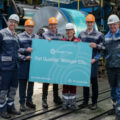BILSTEIN GROUP OBTAINS CO2-REDUCED STEEL FROM THYSSENKRUPP
BILSTEIN GROUP decided to sign contracts with thyssenkrupp Steel Europe and thyssenkrupp Hohenlimburg to start distributing a type of steel called CO2-reduced bluemint bluemint steel from 2023. In a bid to save the environment, Hagen, a leading provider of refrigerated services, will begin producing environmentally friendly products that reduce its carbon footprint to cover its entire product range.
A collaboration agreement was signed to guarantee the long-term supply of reduced steel products in accordance with CO2 certification requirements. Through joint work between the companies thyssenkrupp Steel Europe and Hohenlimburg, the BILSTEIN GROUP in Hagen has achieved a breakthrough in carbon reduction in steel production and processing. These companies have signed an agreement to supply carbon-free steel from 2023, which will come directly from the Duisburg smelter or the environmentally friendly bluemint precision product from Hohenlimburg. In this way, the BILSTEIN GROUP will be able to offer its cold-rolled products with a considerable reduction in carbon dioxide use to its customers.
The BILSTEIN GROUP, for its part, will gradually increase the amount of products purchased until 2030. For this, steps will be taken to start manufacturing with green hydrogen and renewable electricity from 2026 at thyssenkrupp Steel’s Duisburg plant. This will bring high precision hot strips for various grades used for both rolling and tooling used in the automotive and tool processing industries. These certified products are CO2 resistant with technical properties similar to conventional steels without sacrificing the world-renowned quality of the BILSTEIN GROUP.
For both the BILSTEIN GROUP and thyssenkrupp, the agreements are an important contribution to a climate-friendly steel value chain. “For all partners, the MOUs are a major step towards sustainability due to the scale of the agreed volumes. The production and use of high-precision hot strips with reduced CO2 Intensity contributes substantially to reducing global CO2 emissions at all stakeholders,” stresses Dr. Heike Denecke-Arnold, Chief Operating Officer of thyssenkrupp Steel Europe. For the two long-standing companies BILSTEIN GROUP and thyssenkrupp Hohenlimburg, located in the vicinity of Hagen, the agreement underlines their long-standing partnership based on mutual trust.
“To implement our sustainability strategy, it is crucial for the BILSTEIN GROUP to obtain CO2-reduced and, in the future, CO2-neutral input stock: after all, more than 90% of the carbon footprint of finished cold-rolled strip currently comes from the manufacture of hot-rolled strip, our input stock. The agreements with thyssenkrupp are another important step for us on the road to significantly reducing the CO2 emissions of our products as quickly as possible, and becoming carbon neutral in the foreseeable future,” pointed out Marc T. Oehler, CEO and shareholder of the BILSTEIN GROUP.
The BILSTEIN GROUP and thyssenkrupp have long been committed to combating climate change through sustainability. blueTHS Steel is a 70% less CO2-intensive product; it is produced using sponge iron fed by steel scrap instead of coking coal. From 2026, steel will come from direct reduction plants together with melting units powered by hydrogen and green electricity. By 2045 at the latest, thyssenkrupp Steel aims to have completely carbon-neutral production.
The BILSTEIN GROUP is also pursuing an ambitious decarbonization strategy. To this end, the family-owned company in Hagen, Germany, has launched a Green Steel roadmap for far-reaching reductions in Scope 1, Scope 2 and Scope 3 emissions. Its goal is to make its internal production, logistics and administrative processes in Germany carbon neutral by 2035 at the latest.
Since most of the CO2 emissions from cold-rolled steel strip come from the upstream material chain, the BILSTEIN GROUP must pay special attention to this particular CO2 content in order to achieve the targets it has set to significantly reduce the carbon footprint of the finished cold strip. By 2035, the cold-rolling application specialist also intends to switch completely to climate-friendly produced steel grades.









